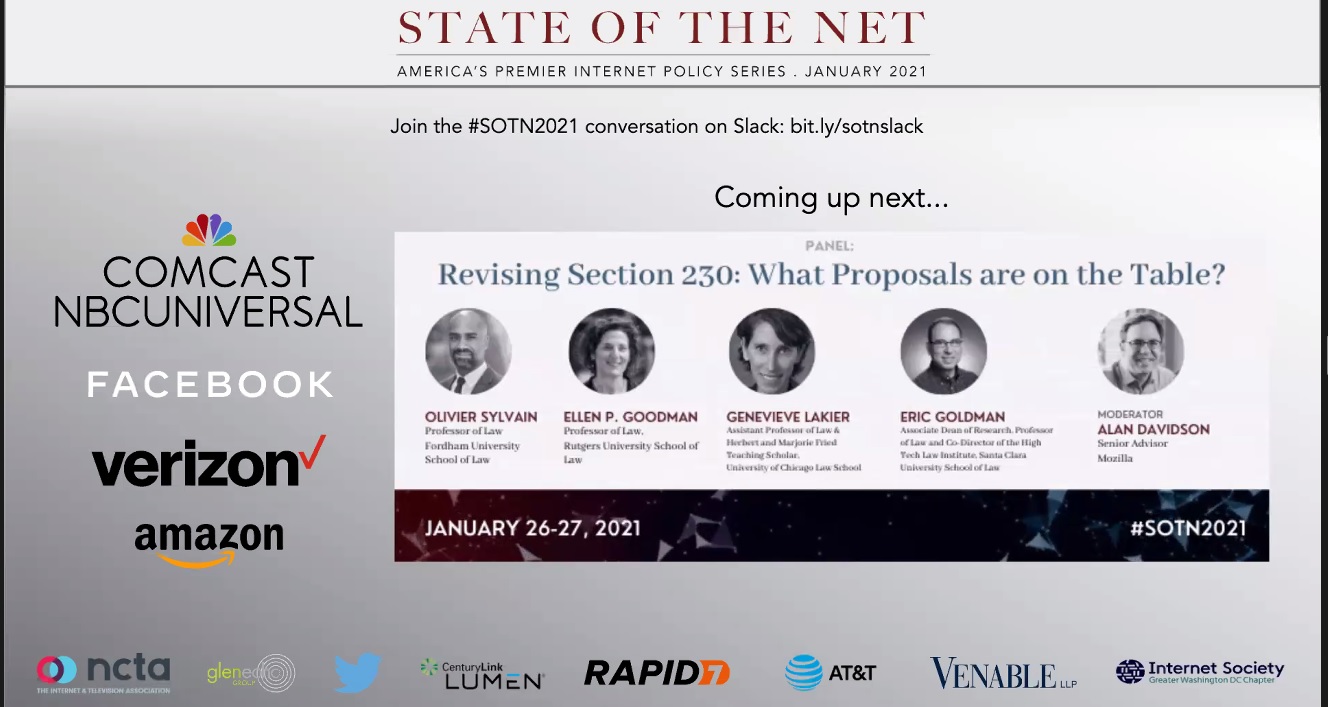Sec. 230 gets Academic Once-Over at State of Net Conference
Issue likely to draw a Hill crowd this session

The smarter way to stay on top of the multichannel video marketplace. Sign up below.
You are now subscribed
Your newsletter sign-up was successful
A group of academics weighed in on the state of Sec. 230 during the virtual State of the Net conference Tuesday (Jan. 26).
Alan Davidson, senior advisor, at Mozilla, who hosted the panel, said that while a year ago revoking or revising Sec. 230 was a long shot, this year things feel different and that "the stakes are higher and the coalition broader."
Sec. 230 of the Communications Decency Act provides social media companies immunity from civil liability for most third-party content on their platforms.
Davidson pointed out that President Trump had vetoed the Defense Authorization bill in part because it lacked Sec. 230 repeal. The Senate overrode the veto, but the point was that it had gone from a fairly obscure provision to central to the debate about the power of social media. It has also been the subject of legislation, and likely of more legislation and debate in this Congress. President Joe Biden signaled as a candidate he had issues with Sec. 230.
Also Read: Reps. Urge Big Tech to Address Algorithmic Extremism
Ellen Goodman, a law professor at Rutgers, said Sec. 230 was a subsection of the bigger issues with social media in general, which was that it had gotten overly powerful, that its business model was based on massive personal data collection and that the platforms acted irresponsibly because of their business model as well as due to political pressure.
She said Sec. 230 had two major issues. One was that it created a moral hazard given that the protection had ballooned beyond its original intent and, two, that all online activity was being treated as free expression worthy of First Amendment protection, rather than distinguishing between speech and conduct.
The smarter way to stay on top of the multichannel video marketplace. Sign up below.
Olivier Sylvain, professor and academic director of the Center on Law & Information Policy at Fordham, agreed that social media conduct that was materially contributing to things like housing discrimination via automated decision-making was being romanticized as protected speech.
All the professors on the panel said they had issues with repealing Sec. 230 altogether, but Sylvain suggested he had fewer objections to that than the rest.
Standing up for Sec. 230 was Eric Goldman, associate dean of research & High Tech Law Institute co-director, Santa Clara University School of Law. Goldman said that it was important to consider how much the section underlays things most everybody loves to do on the internet, which is why repeal should not even be on the table, from social media sites that are getting a lot of criticism these days but still a lot of use, to online shopping to consumer reviews, things that don't exist in an offline world and rely on Sec. 230.
He said even the Zoom call that was the panel's platform was relying on Sec .230. As to reform, which he did not rule out, he cautioned to first identify what problem needed solving, then make sure that reforming 230 is the fix.
Goodman said she was for reform, not repeal, saying the poster company for not repealing was Yelp!, which would not exist without the protections of 230. She said it reminded her of the discussions about chemical companies in the 1960s. They did a lot of harm and a lot of good. She agreed about addressing the power imbalance, but also said that as a veteran regulatory lawyer she liked having Sec. 230--and more to the point the threat of its repeal--as a cudgel to bring platforms to the table.
Also Read: Sen. Markey Says Facebook Was Apparently Used to Plan Insurrection
Genevieve Lakier, assistant professor of Law a the University of Chicago Law School, said she was not a fan of 230 and the power it gave to platforms to make decisions about speech regulation--either taking down or leaving up, without legal liability. She said those decisions were being made without sufficient transparency. But she also said there should be no rush to reform, since that could lead, particularly in the current post-Capitol insurrection climate, to arbitrary takedowns of speech.
Lakier said another issue with reforms would be if a government body starts deciding which editorial processes are OK and which are not. While reforms might get at the social media power issues that concern her, it could also raise First Amendment issues, which is why she argued for a "slow roll" of any reform.
Contributing editor John Eggerton has been an editor and/or writer on media regulation, legislation and policy for over four decades, including covering the FCC, FTC, Congress, the major media trade associations, and the federal courts. In addition to Multichannel News and Broadcasting + Cable, his work has appeared in Radio World, TV Technology, TV Fax, This Week in Consumer Electronics, Variety and the Encyclopedia Britannica.

